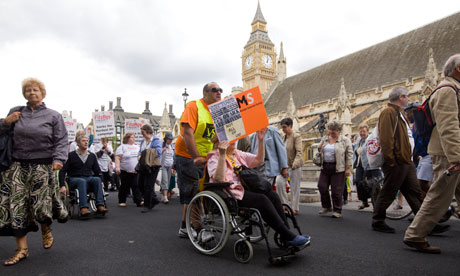Although many of the comments were essentially hate speech, the Twitter example given here shows how the power of mainstream, mass media can be undercut by small campaign groups or individuals on social networks - in some cases at least.
Article link. It carries some strong language, quoting abusive comments.
Disability in society: let's make today #letstalkdisability day
Social media has been useful in triggering a positive debate on how to talk about disability in public. What do you want to ask?
A demonstration by disabled people against cuts to their benefits in Westminster, London. Photograph: Martin Argles for the Guardian
Disabled people are at an impasse. After years of campaigning, the public is finally waking up to the unfair and arbitrary cuts we face under this government. Monday night's Panorama was just one more mainstream documentary highlighting the struggles we face accessing financial and social support. This time, the focus was on private companies that are awarded government contracts to help find disabled people work, yet show scant regard or support for the people they are being paid to help. Panorama claimed to have found evidence of staff using the code "LTB" – lying, thieving bastards – to refer to disabled and unemployed people. How can we expect to be treated with dignity and respect in this context?
Yesterday, the Twitter hashtag #HeardWhilstDisabled gave a pithy insight into the prejudice disabled people are exposed to every single day. The comments people face about their disability on a daily basis ranged from the depressingly offensive ("I think I'd rather kill myself if I was like you. No offence.") to the daily frustrations of accessing basic services ("Couldn't you get your chair into a normal fitting room? We use the accessible one for storage.")
Almost every person with a disability has a similar story to tell.

